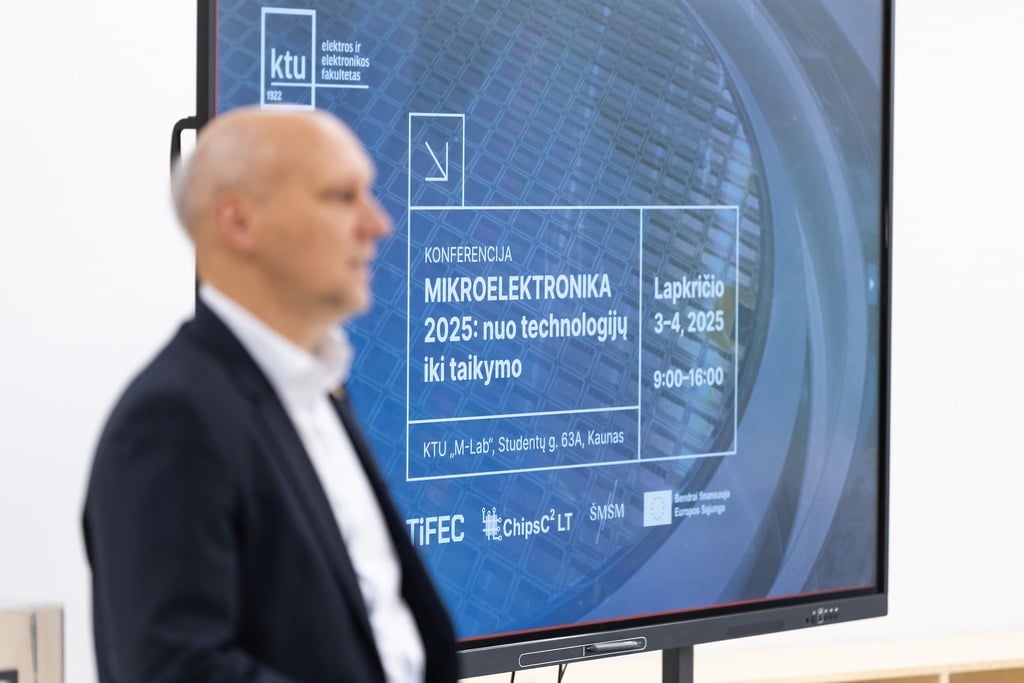Lapkričio 3–4 dienomis Kauno technologijos universitete (KTU) vyko tarptautinė konferencija „MIKROELEKTRONIKA 2025: nuo technologijos iki taikymo“, subūrusi akademikus, inžinierius ir pramonės specialistus.
KTU tarpdisciplininiame prototipų kūrimo laboratorijos centre „M-Lab“ dalyviai aptarė naujausius puslaidininkinių medžiagų, projektavimo ir integravimo technologijų pasiekimus.
Konferenciją atidarė KTU Elektros ir elektronikos inžinerijos fakulteto (EEF) dekanas prof. dr. Mindaugas Žilys, pabrėžęs akademinės bendruomenės ir pramonės bendradarbiavimo svarbą. Diskusijas moderavo KTU Technologijos ir fizinių mokslų kompetencijos centro (TiFEC) ekspertė dr. Agata Romanova.
Dviejų dienų programoje buvo ne tik pristatymai, bet ir praktiniai seminarai, kuriuos vedė tarptautiniai mikroelektronikos projektavimo ir atvirojo kodo puslaidininkių kūrimo ekspertai, įskaitant IHP – Leibnico inovatyvios mikroelektronikos instituto ir Vokietijos tiksliosios įrangos gamintojos „Finetech“ atstovus.
Pagrindinis pranešėjas, IHP „OpenPDK“ konsultantas dr. Wladek Grabinski, aptarė atvirojo kodo projektavimo procesus ir IHP 130 nm BiCMOS technologijos naudojimą. Leo Moser ir Matthias Koeferlein pristatė „LibreLane“ ir „KLayout“ įrankius lustų projektavimui ir išdėstymui, o Holger Voigt, Stefan Frederik Schippers ir dr. Philip Ostrovskyy (IHP) pristatė NGSPICE ir „Xschem“ technologijų naudojimą analoginiam ir mišrių signalų modeliavimui.
Elektronikos inžinerijos katedros prof. Dangirutis Navikas savo pranešime „Netiesinių keraminių kondensatorių naudojimo vidutinės įtampos talpiniuose dalikliuose iššūkiai“ pasidalijo naujausiais TiFEC tyrimų rezultatais.
Antroji konferencijos diena buvo skirta praktiniams mokymams. Leonie Dobis, „Finetech“ taikomųjų programų inžinierė, kartu su savo komanda pristatė 2.0, 2.5 ir 3D hibridinių lustų sistemų technologijas ir vedė praktinius seminarus, skirtus praktiniam lustų pakavimo procesų ir technologijų mokymuisi.
Tuo pačiu metu KTU Lustų projektavimo akademijos dalyviai įgijo praktinės patirties su atvirojo kodo lustų projektavimo ir modeliavimo įrankiais, naudodami IHP OpenPDK modulius.
Tiek pramonės, tiek akademinės bendruomenės atstovai išreiškė pasitenkinimą, kad ši EEF organizuota konferencija tapo nacionaline platforma partnerystėms stiprinti, profesinėms kompetencijoms tobulinti ir dalintis patirtimi.
Svarbu tai, kad šis renginys reikšmingai prisidėjo prie Lietuvos puslaidininkių kompetencijų ekosistemos augimo, kurią plėtoja „ChipsC2-LT“ kompetencijų centras – svarbi nacionalinė iniciatyva, skatinanti bendradarbiavimą, inovacijas ir įgūdžius puslaidininkių technologijų srityje. KTU atlieka neatsiejamą vaidmenį „ChipsC2-LT“ veikloje, aktyviai remdamas Lietuvos strateginę pažangą Europos mikroelektronikos srityje.

